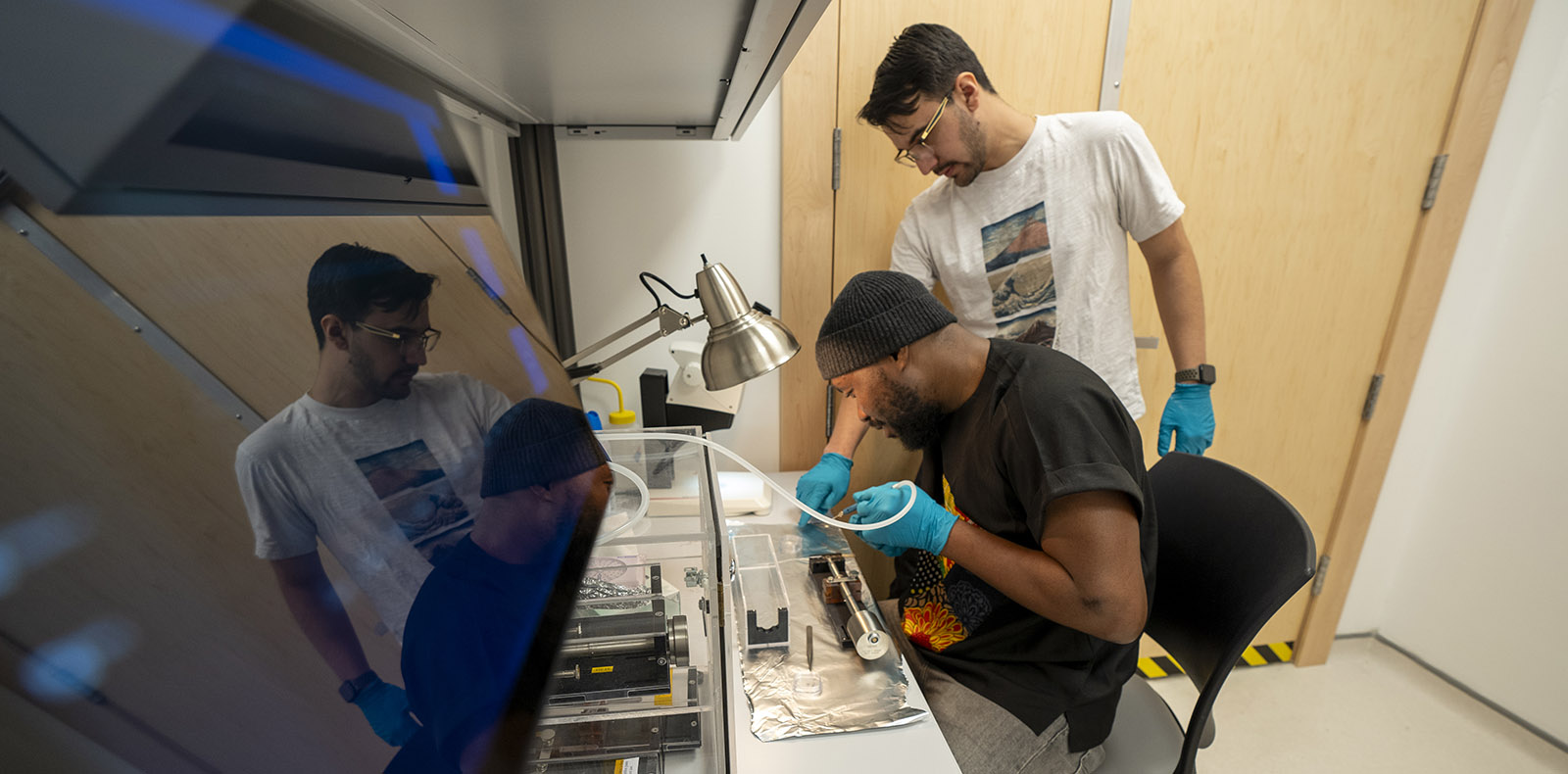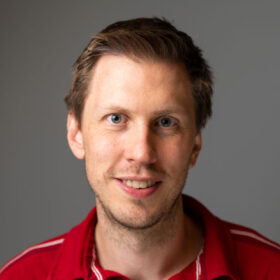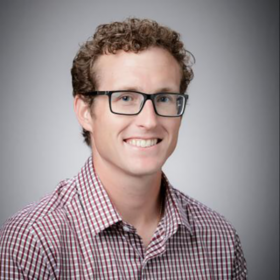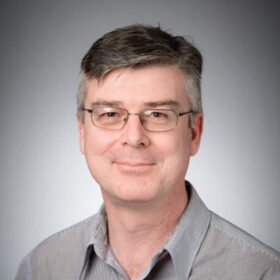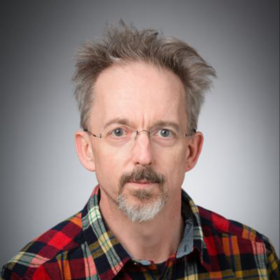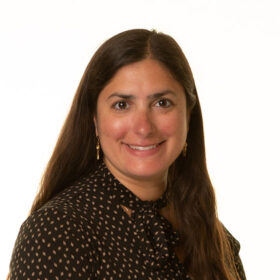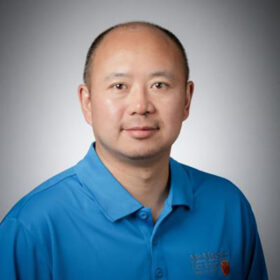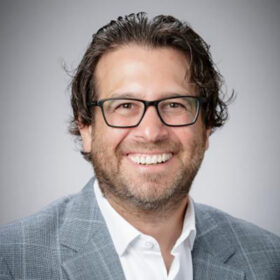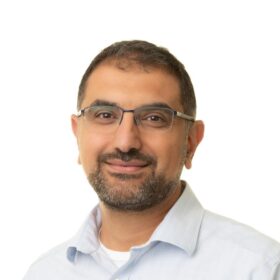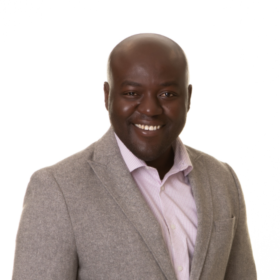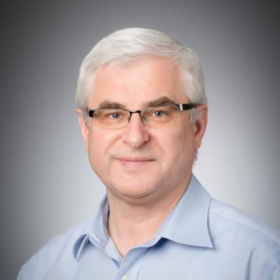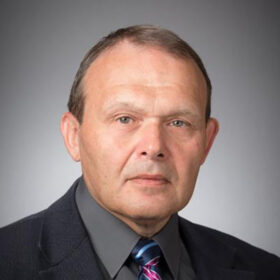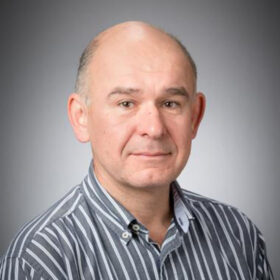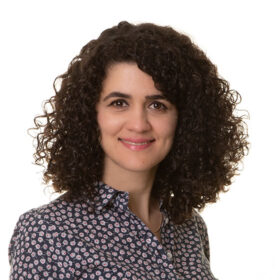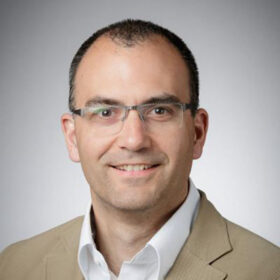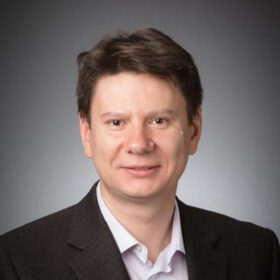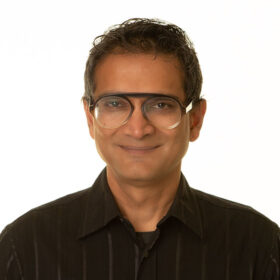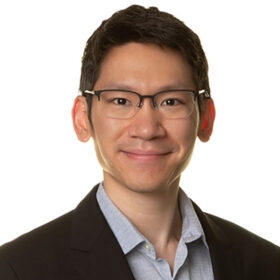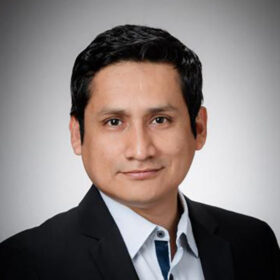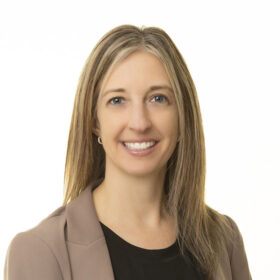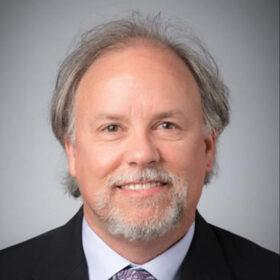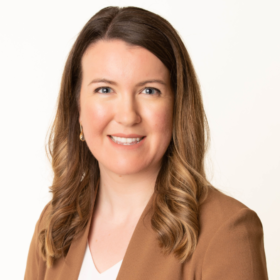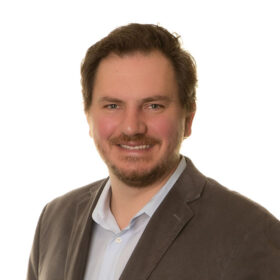-
TECHNICAL ELECTIVE LIST B 3 unit(s) A presentation of recent contributions made to the fields of molecular and cell biology by the use of physical approaches. In particular, the following topics are discussed: physical properties of biomolecules, protein folding, molecular motors, cell motion and cell adhesion. Emphasis on the critical evaluation of current research literature. Three lectures; one term Prerequisite(s): One of CHEM 2R03, CHEMBIO 2P03, ISCI 2A18 A/B, MATLS 2B03, PHYSICS 2H04; or registration in Honours Mathematics and Physics (B.Sc) or an Honours Medical and Biological Physics (B.Sc.) program. BIOPHYS 3S03 is recommended. Antirequisite(s): PHYSICS 4S03 Cross-list(s): BIOCHEM 4S03
-
TECHNICAL ELECTIVE LIST B 3 unit(s) An introduction to the chemistry of implantable biomaterials (metals, ceramics, plastics, elastomers) and the methods used to characterize their physical properties. The wound healing response following insult by an implanted foreign body will be examined, in order to understand the need to control synthetic biomedical interfaces. The regulatory approval process will also be discussed. Three lectures; one term Prerequisite(s): CHEM 1AA3 (or ISCI 1A24 A/B); and BIOLOGY 2B03 (or ISCI 2A18 A/B) or registration in an Honours Chemical Biology program; and one of CHEM 2E03, 2OB3, 2OD3, CHEMBIO 2OB3, 2OD3; or permission of the instructor Cross-list(s): LIFESCI 3BM3 May be offered in alternate years. Offered in 2019-2020.
-
Fundamental concepts of electrochemistry, electrochemical engineering, and electrochemical technologies, with a particular focus on sustainable energy conversion and storage applications. The course will cover current and emerging areas of application for electrochemical technologies, electrochemical reaction kinetics, reactor design, thermodynamics, and mass transport. Three lectures; second term Prerequisite(s): Registration in level 4 or above of any chemical or materials engineering program, or permission from the Department
-
TECHNICAL ELECTIVE LIST B 3 unit(s) Review of multivariate statistics. Acquiring, interpreting and processing large data sets. Introduction to dimensional reduction techniques such as principal component analysis (PCA) and projection of latent structures (PLS). Introduction to data clustering methods. Chemical and materials engineering applications. Three lectures; one term Prerequisite(s): One of COMMERCE 2QA3, STATS 3Y03, MATLS 3J03 or HTHSCI 2A03 or permission of the department
-
An introduction to the basic principles of polymer processing, stressing the development of models. Rheology of polymers, extrusion, moulding, films, fibres, and mixing. Reactive processing. Three lectures; one term Prerequisite(s): One of CHEM ENG 3A04 (or 2A04), MATLS 3E04 or MECH ENG 3R03; and CHEM ENG 2O04 (or 3O04) or MECH ENG 3O04
Cross-listed: CHEM ENG 4X03/ CHEM ENG 6X03 -
Physical principles of medical image acquisition and formation; post-processing for magnetic resonance imaging and spectroscopy; comparisons to other medical imaging modalities.
Pre-requisites: ELECENG 2FH3 or 2FH4 or ENGPHYS 2A04, ELECENG 3TP4 or 3TP3 or IBEHS 3A03
Antirequisite: MEDPHYS 4D03
Lectures: Tuesdays 7:00-10:00pm
Labs (Every Other Week): Thursdays 2:30-5:30pm or 7:00-10:00pm, starting the week of January 12th. Tutorial: Every Friday 11:30am-12:20pm, (starting Jan 9th) -
This course will provide students an opportunity for formal recognition of the design-based experiential learning conducted within the atmosphere of technically-oriented McMaster Engineering teams. Arrangements for participation in this course must be made with the faculty supervisor in the Spring semester prior to enrolment. One lecture (three hours); term 1 and 2 Prerequisite(s): Registration in Level 3 or above in the Faculty of Engineering
-
TECHNICAL ELECTIVE LIST B This course will provide students an opportunity for formal recognition of the design-based experiential learning conducted within the atmosphere of technically-oriented McMaster Engineering teams. Arrangements for participation in this course must be made with the faculty supervisor in the Spring semester prior to enrolment. One lecture (three hours); term 1 and 2 Prerequisite(s): Registration in Level 3 or above in the Faculty of Engineering
-
4 unit(s)
Electronic properties of semiconductors: non-equilibrium carrier conditions; steady state and non-steady state; p-n junctions; Schottky diodes; bipolar junction transistors. Detailed coverage of a range of diodes including photodiodes, solar cells, light emitting diodes, zener diodes, and avalanche diodes.
Three lectures, one tutorial, one lab (three hours) every other week; second term
Prerequisite(s): Credit in at least one of the following: ELECENG 2EI4, ENGPHYS 3BA3, ENGPHYS 3BA4, ENGPHYS 3SM3, MATLS 2Q03 or Registration in ENGPHYS 3SM3
Antirequisite(s): MATLS 3Q03 -
3 unit(s)
This course covers the basic principles of light interaction with biological systems and specific biomedical applications of photonics such as optical light microscopy, endoscopic imaging, spectroscopy in clinical diagnosis, flow cytometry, micro-optical sensors, etc.
Three lectures; second term
Prerequisite(s): Registration in Level III or above in the Faculties of Engineering, Science, or Health Sciences, or the Integrated Biomedical Engineering & Health Sciences (IBEHS) Program
Cross-list(s): MEDPHYS 4I03 -
TECHNICAL ELECTIVE LIST B This course gives an in-depth investigation of advanced semiconductor devices, with a focus on novel materials. The course will cover aspects of fabrication, operation and design for modern semiconductor devices, highlighting traditional, nanoscale and excitonic/organic device physics. Three lectures; second term Prerequisite(s): ENG PHYS 3F03 or 3F04; and credit or registration in one of ENG PHYS 3PN3, 3PN4 or 4E03; or MATLS 3Q03, 4Q03
-
3 unit(s)
A review of photovoltaic devices including solar cell operation, characterization, manufacturing, economics and current and next generation technologies.
Three lectures; first term
Prerequisite(s): One of ENGPHYS 3BA3, ENGPHYS 3BA4, or ELECENG 2EI5 or ELECENG 2EI4, or permission of the instructor with MATLS 3Q03 -
Crystallography, phase diagrams, phase transformations, Miller indices, slip systems and the basis of plastic deformation, biomaterials, tools for materials analysis, metallography, and introduction to microstructure/property relations. Two lectures, one tutorial (two hours), one lab (three hours), first term Prerequisite(s): Registration in Level II or above in Materials Engineering Antirequisite(s): MATLS 2H04, MATLS 2X03
-
-
3 unit(s) First and Second Laws. Reversible and irreversible processes. State functions, variables, relations among them. The Third Law. Thermodynamics of reactions. Unary systems. Real gases. Electrochemistry. Two lectures, two tutorials, one lab (one and a half hours); first term Prerequisite(s): Registration in Level II or above in Materials Engineering; CHEM 1A03 or 1E03 Antirequisite(s): ENGPHYS 2H04, PHYSICS 2H04
-
-
-
-
4 unit(s) An introduction to the electronic structure and properties of materials: electrons and their behavior in vacuum and in a crystal lattice, electronic structure of elements, crystal bonding, free electron theory of metals and band structure of solids, electrical and thermal properties of solids. Three lectures, one lab (three hours); first term Prerequisite(s): Registration in Level II or above in Materials Engineering
-
-
3 unit(s) Surface science and technology related to the preparation of fine particles of minerals, metals and ceramics for industrial production. Application of electrochemistry for diverse materials processing, such as electrometallurgy, thin film production and anodizing. Three lectures; second term Prerequisite(s): MATLS 2D03; and Registration in Level II or above in Materials Engineering
-
-
TECHNICAL ELECTIVE LIST A 3 unit(s) Gaseous systems. Phase rule. Systems with gas phase and pure condensed phases. Ellingham diagram. Predominance diagrams. Systems with gas phase and condensed solutions. Pourbaix diagrams. Two lectures, two tutorials, one lab (one and a half hours); first term Prerequisite(s): MATLS 2D03; and Registration in Level II or above in Materials Engineering Antirequisite(s): MATLS 3C04
-
-
4 unit(s) Phenomenological and mechanistic approaches to steady and non-steady state diffusion, boundary conditions, mechanisms of diffusion, Arrhenius behaviour, gassolid reactions, precipitate growth and dissolution, plate and spherical geometries, plane front solidification, diffusion in concentrated alloys, the Kirkendall effect, the interdiffusion coefficient, diffusion couples with intermediate phases, mass transport with convection, transient diffusion in fluids, the mass transfer coefficient. Two lectures, three hours, two tutorials one hour; first term. Prerequisite(s): MATLS 2D03 and MATH 2ZZ3; and Registration in Level II or above in Materials Engineering
-
3 unit(s) Fundamentals of processing, building on a knowledge of heat and mass transfer. High temperature processing of materials, focusing on heat sources, solid state processing of powders and liquid state processing, high temperature production routes for most important metals. Three lectures, one tutorial (one hour); second term Prerequisite(s): MATLS 2D03; and Registration in Level II or above in Materials Engineering
-
-
3 unit(s) Introduction to probability. Linear and non-linear regression analysis, multi-response estimation, design of experiments including factorial and optimal design, statistical process control. Emphasis on analysis of industrial problems. Three lectures; first term Prerequisite(s): Registration in Level III above of Materials Engineering or Chemical
-
Real-world applications of heat and mass transfer. Concepts are applied through case studies, simulations, and hands-on projects, utilizing industrially relevant software and modelling techniques-problem-solving, solution development, and optimizing heat and mass transfer systems in engineering contexts.
Two lectures, one tutorial (two hours); second term
Prerequisite(s): MATLS 3TP4, CHEMENG 2O04
Antirequisite(s): CHEMENG 3T06, CHEMENG 3A04, MATLS 3E04, MECHENG 3R03, ENGPHYS 3004, MECHENG 4J03, CHEMENG 3M04 -
-
3 units Elastic and Plastic Deformation of Materials. Strengthening Methods. Fracture Mechanisms. Fatigue and Creep failure. Three lectures, one lab (one hour) every other week; second term Prerequisite(s): ENGINEER 2P04 or CIVENG 2P04 and Registration in Materials Engineering; or MECHENG 2P04 and Registration in Mechanical Engineering; or permission of the department
-
-
TECHNICAL ELECTIVE LIST A Offered jointly by the Departments of Mechanical Engineering and Materials Science and Engineering. Processing methods for a wide range of materials, including metals, ceramics and plastics. The analytical basis for understanding and optimizing materials processes. Exercises in mathematical modelling and the use of software packages to optimize processes. Three lectures; second term Prerequisite(s): MATLS 3M03 or MECH ENG 3A03 or registration in Level IV or above in Civil Engineering.
-
-
TECHNICAL ELECTIVE LIST A 3 unit(s) Fundamental properties of materials used in electronic applications, operation of devices and fabrication methods of electronic circuits and packaging. Includes description of dielectric, magnetic and optoelectronic properties. Three lectures; second term Prerequisite(s): One of MATLS 2Q04, ENG PHYS 2QM3; or permission of the department Anti-requisite(s): ENG PHYS 3PN4
-
4 unit(s) Molar Gibbs energy diagrams. Fundamentals of diffusion. Curved interfaces, GibbsThomson effect. Grain growth, Zener pinning. Homogeneous and heterogeneous nucleation. Solidification. Scheil formalism. Constitutional supercooling. Eutectic growth. Coarsening. Recovery, recrystallization. Spinodal decomposition. Eutectoid, massive, order-disorder and martensitic transformations. Three lectures, one lab (three hours); second term Prerequisite(s): MATLS 2A04 and 2D03; and Registration in Level II or above of Materials Engineering
-
-
Fundamental principles of heat and mass transfer, focusing on the underlying physics and mathematical descriptions governing conduction, convection, radiation and diffusion. Students will develop analytical solutions as applied to materials applications.
Three lectures, one tutorial (two hours); first term
Prerequisite(s): MATLS 2D03 and MATH 2ZZ3; and Registration in Level II or above in any Materials Engineering
Antirequisite(s): CHEMENG 3T06, CHEMENG 3A04, MATLS 3E04, MECHENG 3R03, ENGPHYS 3004, MECHENG 4J03, CHEMENG 3M04 -
-
3 unit(s) Introduction to biomaterials. Includes material-tissue interactions, techniques for biomaterials testing, and characterization. Applications of biomaterials and the clinical context of their use will be introduced. Three lectures; one term Prerequisite(s): Registration in Level III or above in Materials Engineering; or Registration in Level IV or above in the Integrated Biomedical Engineering and Health Sciences (IBEHS) program
-
-
TECHNICAL ELECTIVE LIST A 3 unit(s) Theory and practice of iron making. New processes for reduced energy consumption and pollution. Thermodynamics and kinetics of steelmaking. Steel refining. Casting, including new near net shape technologies. Specialty steelmaking. Three lectures; second term Prerequisite(s): Registration in Level III or above in Materials Engineering; or permission of the department Co-requisite(s): MATLS 3F03 Offered on an irregular rotation basis
-
TECHNICAL ELECTIVE LIST A 3 unit(s) Thermodynamics, electrochemistry, electrified interface, electrode potential, Faraday’s Law, Butler-Volmer equation, activation polarization, concentration polarization, mixed potential theory, passivity, rate measurement techniques, galvanic corrosion, stress corrosion cracking, intergranular corrosion, materials selection, cathodic protection, anodic protection, inhibitors/biocides. Three lectures; first term Prerequisite(s): Registration in Level III above in Materials Engineering; or permission of the department Offered on an irregular rotation basis.
-
TECHNICAL ELECTIVE LIST A 3 unit(s) Synthesis routes for nanomaterials, bottom-up and top-down approaches, green chemistry methods, properties of materials: carbon nanotubes, nanoparticles, quantum dots. Environmental and health impact of nanomaterials. Three lectures; second term Prerequisite(s): Registration in Level III or above in Materials Engineering, Engineering Physics or Chemistry; or permission of the department Offered on an irregular rotation basis.
-
TECHNICAL ELECTIVE LIST A 3 unit(s) Interaction of electrons and photons with matter. Imaging methods with electron microscopy, scanning probe techniques, x-ray photoelectron spectroscopy and X-ray absorption analysis with high spatial resolution. Three lectures; first term Prerequisite(s): Registration in Level III or above in Materials Engineering, Chemical Engineering, Engineering Physics or Honours Chemistry; or permission of the department. Offered on an irregular rotation basis.
-
-
3 unit(s) Sustainable development, ingenuity gap, materials cycles, Eco-Efficiency, Environmental Impact parameters, introduction and the computational structure of life cycle analysis, waste treatment and recycling technologies, impact of sustainable practice, stakeholder strategies. Three lectures, one tutorial (one hour); one term Prerequisite(s): Registration in Level III or above of Materials Engineering or Chemical Engineering; or permission of the department
-
-
TECHNICAL ELECTIVE LIST A 6 unit(s) Several written and oral reports are required in each term. The written thesis is defended orally. Nine unscheduled hours each week; both terms Prerequisite(s): Registration in Level IV or above in Materials Engineering and a GPA of at least 8.0 and permission of the department Antirequisite(s): MATLS 4KA3, MATLS 4KB3, IBEHS 3I06 A/B
-
-
2 unit(s) A sequence of experiments to simulate industrial production of an Al-Mg-Si alloy. Accompanying lectures illustrate the engineering principles that underpin the industrial process. One lecture, one lab (three hours) Prerequisite(s): Registration in the final Level of a Materials Engineering program Antirequisite(s): MATLS 4L02, MATLS 4L04
-
-
2 unit(s) A sequence of experiments to investigate surface modification of biomaterials involving electrodeposition of composite biopolymers and relevant biological characterization methods. One lecture, one lab (three hours) Prerequisite(s): Registration in the final level of Materials Engineering Antirequisite(s): MATLS 4L02, MATLS 4L04
-
-
2 unit(s) A sequence of experiments to investigate and study a wide range of thin film growth methods and applications including vacuum deposition, electrodeposition, spin coating, sol gel, and sacrificial oxidation. One lecture, one lab (three hours) Prerequisite(s): Registration in the final Level of a Materials Engineering program Antirequisite(s): MATLS 4L02, MATLS 4L04
-
-
2 unit(s) A sequence of experiments to simulate industrial thermal-mechanical processing of low-carbon, low alloy steels. Accompanying lectures illustrate the engineering principles that underpin the industrial process. One lecture, one lab (three hours) Prerequisite(s): Registration in the final Level of a Materials Engineering program Antirequisite(s): MATLS 4L02, MATLS 4L04
-
-
TECHNICAL ELECTIVE LIST A 3 unit(s) Materials and chemical engineering applications of machine learning with topics in: Bias, neural networks, deep learning and learning theory. Classification, supervised learning, unsupervised learning, generative networks, reinforcement learning. Prerequisite(s): MATLS 3J03 Offered on an irregular rotation basis.
-
-
4 unit(s) Materials indices, materials selection charts, materials selection and design with mechanical and thermo-mechanical constraints, design of hybrid materials, sustainable materials selection and design. Two lectures (two hours), one tutorial (one hour); first term Prerequisite(s): One of ENGINEER 2P04, MECHENG 2P04, CIVENG 2P04 and one of CHEMENG 3A04, MECHENG 3R03; or registration in Level IV or above in Civil Engineering; or permission of the department Antirequisite(s): ENGINEER 4T04
-
-
TECHNICAL ELECTIVE LIST A 3 unit(s) Microscopic insight to the structure of functional materials used in photovoltaics, light generation, piezoelectronics and origin of their properties from atomic-scale simulations. One lecture (one hour) and One lecture (two hours); second term Prerequisite(s): Registration in Level III or above in Materials Engineering or Engineering Physics; or permission of the department Offered on an irregular rotation basis.
-
-
TECHNICAL ELECTIVE LIST A 3 unit(s) Applications of heat transfer, mass transfer, and fluid flow conservation equations to industrial materials processes in metals and polymers; scaling analysis; finite element analysis. Two lectures (three hours), one tutorial (one hour); first term Prerequisite(s): Two of CHEM ENG 2O04, CHEMENG 3A04, MATLS 3TP4; or permission of the department Offered on an irregular rotation basis.
-
TECHNICAL ELECTIVE LIST A 3 unit(s) Structure of amorphous and crystalline polymeric materials; mechanical, electrical and optical properties, and their modification through processing. Three lectures; first term Prerequisite(s): Registration in Level III or above of Materials Engineering; or permission of the department Offered on an irregular rotation basis.
-
TECHNICAL ELECTIVE LIST A 3 unit(s) Sensors and sensing materials for big data and artificial intelligence systems. Discussion of the theory, design and fabrication of chemical, thermal, electrical, magnetic and optical sensors. Prerequisite(s): MATLS 2Q04 or ENG PHYS 3PN4 Offered on an irregular rotation basis
-
3 unit(s) Intrinsic properties of matrix materials and fibres; mechanics and thermodynamics of interfaces; mechanical properties and fabrication of engineering composites. Prerequisite(s): MATLS 3M03 or permission from the department Offered on an irregular rotation basis.
-
TECHNICAL ELECTIVE LIST A 3 unit(s) Advanced applications of biomaterials including nanobiomaterials, drug delivery, regenerative medicine, microfluidics, biosensing, immunomodulatory materials. Three lectures; one term Prerequisite(s): MATLS 4B03 and registration in Level III or above in Materials Engineering; or Registration in Level IV or above in the Integrated Biomedical Engineering and Health Sciences (IBEHS) program Offered on an irregular rotation basis.
-
-
6 unit(s) Projects, in cooperation with industry, focusing on materials or energy, involving design, economic analysis and sustainability. Students working in teams of four are assessed on oral and written reports. Two labs (three hours); both terms Prerequisite(s): Registration in the final year of Materials Engineering
-
-
3 unit(s) Sustainable development, materials cycles, methods for measuring environmental impact, life cycle analysis, waste treatment and recycling technologies.
Cross-listed: MATLS 6I03 / SEP 6I03 / MECHENG 6XI3
TERM 1 -
-
4 unit(s) Materials indices, materials selection charts, materials selection and design with mechanical and thermo-mechanical constraints, design of hybrid materials, sustainable materials selection and design. Two lectures (two hours), one tutorial (one hour); first term
-
-
3 unit(s) Microscopic insight to the structure of functional materials used in photovoltaics, light generation, piezoelectronics and origin of their properties from atomic-scale simulations. One lecture (one hour) and One lecture (two hours); second term Prerequisite(s): Registration in Level III or above in Materials Engineering or Engineering Physics; or permission of the department Offered on an irregular rotation basis.
-
-
3 unit(s) Structure of amorphous and crystalline polymeric materials; mechanical, electrical and optical properties, and their modification through processing. Three lectures; first term Prerequisite(s): Registration in Level III or above of Materials Engineering; or permission of the department Offered on an irregular rotation basis.
-
3 unit(s) Intrinsic properties of matrix materials and fibres; mechanics and thermodynamics of interfaces; mechanical properties and fabrication of engineering composites. Three lectures; second term Prerequisite(s): MATLS 3M03 or permission from the department Offered on an irregular rotation basis.
-
Each student is required to prepare and present a major seminar, based upon extensive research work and literature surveys, on any topic of current research interest in Materials Science and Engineering. A grade will be assessed based on overall performance in the course. 3 unit(s)
-
-
Each student is required to prepare and present major seminars, based upon extensive research work and literature surveys, in areas related to their current research. A grade will be assessed based on overall performance in the course. 3 unit(s)
-
-
(cross-listed: BIOMED 708/ MATLS 703)
This course will introduce students to the various classes of biomaterials and their associated properties, including metallic, ceramic, polymeric, and nanomaterials. We will explore topics in material-tissue interactions, and techniques for biomaterials testing and characterization. Current applications of biomaterials and the clinical context of their use will be introduced -
Fundamentals of Solidification, Review of Solidification processes, near net shape solidification, molten metal handling and treatment, cast part quality. Cross-listed with Mech Eng 714. 3 units
-
The study of technologically important metals, ceramics, polymers and molecular solids with magnetic, ferroelectric, piezoelectric, pyroelectric, optical, and electronic properties as well as energy storage and conversion functionality.
-
-
3 unit(s) An introduction to the theory, physics and operating principles of Scanning electron microscopy (SEM), Focused Ion Beam (FIB) microscopy and attendant diffraction and spectroscopy techniques. The course will have laboratory component allowing students to students to establish core competence in hands-on use of these microscopes.
Cross-listed: MATLS 724 / ENG PHYS 724 / CHEM ENG 724 / MECH ENG 726
TERM 1 -
3 unit(s) Antirequisite(s): Permission of the instructor required. Introduction to transmission electron microscopy: electron sources, optics, TEM, Scanning-TEM, electron-solid interactions, diffraction, imaging, and spectroscopy. Course will include a practical component with demonstration labs.
-
-
3 Units This course lays the foundation of fundamental kinetics which is then used to examine advanced topics in heterogeneous kinetics. These may include evaluation of systems under shifting mixed control, elucidation of reaction mechanism, capillary effects in reactions involving liquid phases, liquid-gas reactions, liquid-liquid reactions, gas reactions with porous solids, gas-solid reactions with protective product layers, transport properties of mixed conductor liquids, isotope exchange measurements in gas-liquid reaction studies.
-
-
Prerequisite(s): Must be enrolled in any Graduate Plan and have successfully completed MATLS 734 This course is a study of 2D and 3D X-ray diffraction for the characterization of crystalline solid materials. We will examine the diffraction information obtained in phase, texture and residual stress analyses of metals, coatings, thin films, polymers, etc. using area detector techniques. We will look at safety, sample preparation, data processing software and interpretation of results. The students will study their own research samples and present their analyses to the class. 1.5 units
-
The study of single crystals, how they diffract X-rays, and how the diffraction patterns can be analyzed to provide the molecular and crystal structures of organic, organometallic, and inorganic solids. This course must be taken as a pre-requisite to MATLS 730. 1.5 unit(s)
-
The fundamentals of deformation and fracture in a wide range of materials including metals and their alloys, ceramics, polymers, composites and foams; elasticity; plastic deformation and dislocation theory; strengthening mechanisms; thermally activated flow and creep; deformation under cyclic loading; fracture processes in both brittle and ductile materials; effect of temperature and fatigue on fracture.
-
-
From time to time, modules will be offered on subjects of interest to the Department faculty. The Special Topic for 2025/2026 is
. (3 units) -
-
TECHNICAL ELECTIVE LIST B 3 unit(3) ntroduction to SAS; linear regression model; least squares method; model fitting and diagnostics; influential analysis; model building; one-way and two-way ANOVA; applications. Three lectures, one lab; one term Prerequisite(s): ARTSSCI 2R03 or STATS 2MB3

